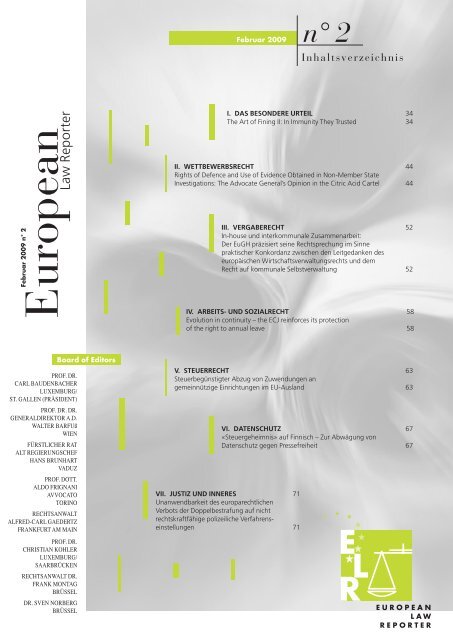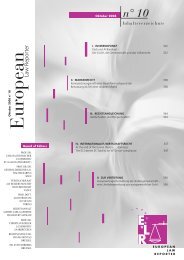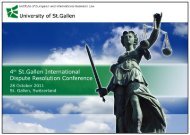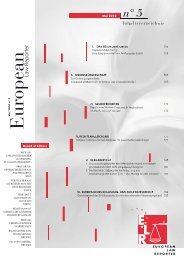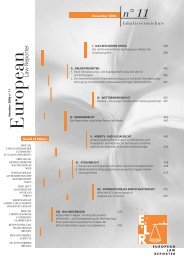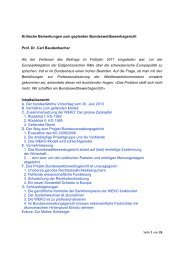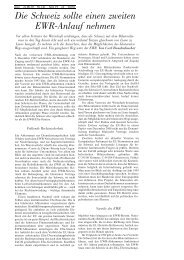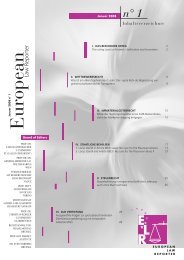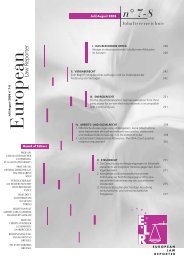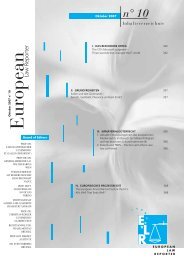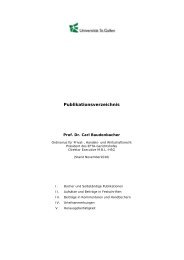European - Institut für Europäisches und Internationales ...
European - Institut für Europäisches und Internationales ...
European - Institut für Europäisches und Internationales ...
You also want an ePaper? Increase the reach of your titles
YUMPU automatically turns print PDFs into web optimized ePapers that Google loves.
<strong>European</strong><br />
Februar 2009 n° 2<br />
Law Reporter<br />
PROF. DR.<br />
CARL BAUDENBACHER<br />
LUXEMBURG/<br />
ST. GALLEN (PRÄSIDENT)<br />
PROF. DR. DR.<br />
GENERALDIREKTOR A.D.<br />
WALTER BARFUß<br />
WIEN<br />
FÜRSTLICHER RAT<br />
ALT REGIERUNGSCHEF<br />
HANS BRUNHART<br />
VADUZ<br />
PROF. DOTT.<br />
ALDO FRIGNANI<br />
AVVOCATO<br />
TORINO<br />
RECHTSANWALT<br />
ALFRED-CARL GAEDERTZ<br />
FRANKFURT AM MAIN<br />
PROF. DR.<br />
CHRISTIAN KOHLER<br />
LUXEMBURG/<br />
SAARBRÜCKEN<br />
RECHTSANWALT DR.<br />
FRANK MONTAG<br />
BRÜSSEL<br />
DR. SVEN NORBERG<br />
BRÜSSEL<br />
Board of Editors<br />
Februar 2009 n°<br />
2<br />
Inhaltsverzeichnis<br />
I. DAS BESONDERE URTEIL 34<br />
The Art of Fining II: In Immunity They Trusted 34<br />
II. WETTBEWERBSRECHT 44<br />
Rights of Defence and Use of Evidence Obtained in Non-Member State<br />
Investigations: The Advocate General’s Opinion in the Citric Acid Cartel 44<br />
III. VERGABERECHT 52<br />
In-house <strong>und</strong> interkommunale Zusammenarbeit:<br />
Der EuGH präzisiert seine Rechtsprechung im Sinne<br />
praktischer Konkordanz zwischen den Leitgedanken des<br />
europäischen Wirtschaftsverwaltungsrechts <strong>und</strong> dem<br />
Recht auf kommunale Selbstverwaltung 52<br />
IV. ARBEITS- UND SOZIALRECHT 58<br />
Evolution in continuity – the ECJ reinforces its protection<br />
of the right to annual leave 58<br />
V. STEUERRECHT 63<br />
Steuerbegünstigter Abzug von Zuwendungen an<br />
gemeinnützige Einrichtungen im EU-Ausland 63<br />
VI. DATENSCHUTZ 67<br />
«Steuergeheimnis» auf Finnisch – Zur Abwägung von<br />
Datenschutz gegen Pressefreiheit 67<br />
VII. JUSTIZ UND INNERES 71<br />
Unanwendbarkeit des europarechtlichen<br />
Verbots der Doppelbestrafung auf nicht<br />
rechtskraftfähige polizeiliche Verfahrenseinstellungen<br />
71<br />
EUROPEAN<br />
LAW<br />
REPORTER
Das besondere Urteil<br />
I<br />
34<br />
I. Christian Mayer, St. Gallen<br />
In the past, consultancy and trust firms pursued<br />
their business <strong>und</strong>er a certain immunity from<br />
Community competition law due to the fact that<br />
they are usually not active in a market affected by<br />
a restriction of competition. With the present<br />
judgment, the Court of First Instance confirms the<br />
Commission’s reorientation of its respective enforcement<br />
and fining policy by affirming, inter<br />
alia, the identification of consultancy and trust<br />
firms as facilitators of cartels, irrespective of their<br />
inactivity in the relevant market, as well as the application<br />
of a concept of passive participation.<br />
(1) Fact and Procedure<br />
(a) Backgro<strong>und</strong><br />
Backgro<strong>und</strong> to the judgment at hand is a cartel<br />
formed and implemented on the <strong>European</strong> market<br />
for organic peroxides – chemicals used in the<br />
plastics and rubber industry – by, inter alia, the<br />
AKZO group («AKZO»), Atofina SA («Atofina»)<br />
and Peroxid Chemie GmbH & Co KG controlled by<br />
Laporte plc, now Degussa UK Holdings Ltd.<br />
(«PC»). Fo<strong>und</strong>ed in 1971 by written agreement<br />
and subsequently amended in 1975, the aim of<br />
the cartel was mainly to preserve the market<br />
shares of the involved producers and to coordinate<br />
their price increases. 1 Under the agreement,<br />
Fides Trust AG («Fides») and, from 1993 onwards,<br />
the applicant in the present case, AC-Treuhand<br />
AG («AC»), were entrusted with the following duties<br />
by virtue of respective agency agreements<br />
with the three producers: the storage of certain<br />
secret documents relating to the cartel, including<br />
the original agreement of 1971, on their<br />
premises; the collection and processing of certain<br />
information concerning the activity of the<br />
producers; the communication to them as regards<br />
such information; and the provision of clericaladministrative<br />
and logistic services with respect<br />
to the organization of meetings between<br />
the producers, mainly held in Zurich, such as the<br />
reservation of rooms and the reimbursement of<br />
travel costs.<br />
(b) Procedure<br />
Following a meeting with representatives of AKZO<br />
seeking immunity <strong>und</strong>er the Leniency Notice2 in<br />
April 2000, the Commission initiated investigations<br />
into the cartel. Thereafter, Atofina and PC<br />
also offered their cooperation and disclosed addi-<br />
E L R 2 / 2 0 0 9 n o 2<br />
<strong>European</strong> Law Reporter<br />
The Art of Fining II: In Immunity They Trusted<br />
(AC-Treuhand AG Commission of the <strong>European</strong> Communities,<br />
CFI, Judgment of 8 July 2008, T-99/04)<br />
tional information. On 3 February 2003 the Commission<br />
sent a request for information to AC,<br />
stating that it was investigating a putative infringement<br />
of the Community competition rules<br />
by the <strong>European</strong> producers of organic peroxides<br />
and requiring AC to provide an organigram of its<br />
<strong>und</strong>ertaking as well as to describe its activity and<br />
its development including its takeover of the<br />
activity of Fides, its duties as the «secretariat» for<br />
the producers and its annual turnover for the<br />
years 1991 to 2001. 3<br />
After AC had responded to the request, the Commission<br />
informed AC in a meeting on 20 March<br />
2003 that it was also concerned by the ongoing<br />
investigation, without however specifying its allegations.<br />
Only one week later, the Commission initiated<br />
the formal examination procedure and<br />
adopted a statement of objections which it served<br />
inter alia to the applicant. AC then submitted its<br />
observations to the statement of objections and<br />
attended the respective hearing in June 2003. Finally,<br />
on 3 December 2003, the Commission<br />
adopted a decision by virtue of which it imposed<br />
fines on the producers and, in particular, a fine in<br />
the amount of EUR 1.000.- on AC. 4 In an accompanying<br />
press release, the Commission emphasized<br />
the important role that, in its view, AC as a<br />
consultancy firm had played in the cartel by organizing<br />
meetings and covering evidence, and<br />
stated with respect to the amount of the fine that<br />
«[t]he sanction against AC Treuhand is limited in<br />
amount because of the novelty of the approach.<br />
The message is clear: organisers or facilitators of<br />
cartels, not just the cartel members, must fear that<br />
they will be fo<strong>und</strong> and heavy sanctions [be] imposed<br />
from now on». 5<br />
On 16 March 2004, AC brought an action for annulment<br />
of the Contested Decision before the<br />
CFI based on the following 5 pleas in law: (i) infringement<br />
of the rights of the defence and of the<br />
right to a fair hearing; (ii) infringement of the principle<br />
of nullum crimen, nulla poena sine lege; (iii)<br />
infringement of the principle of the protection of<br />
legitimate expectations; (iv) in the alternative, infringement<br />
of the principle of legal certainty and<br />
the principle of nulla poena sine lege certa; and (v)<br />
infringement of the principle of legal certainty and<br />
the principle of nulla poena sine lege certa as re-
n o 2<br />
<strong>European</strong> Law Reporter<br />
E L R 2 / 2 0 0 9<br />
gards the second paragraph of Article 3 of the<br />
Contested Decision. 6 In essence, AC requested the<br />
Court to annul the Contested Decisions in so far as<br />
it was concerned by it and to order the Commission<br />
to pay the costs. Apart from those main pleas,<br />
the applicant filed several requests for confidentiality<br />
and confidential treatment, all of which<br />
were either withdrawn by AC in the course of the<br />
proceedings or rejected by the CFI in its judgment.<br />
7<br />
(2) Judgment<br />
(a) Alleged infringement of the rights of the defence<br />
and of the right to a fair hearing<br />
In its first plea, AC in essence alleged an infringement<br />
of its rights of defence, in particular of its<br />
right to a fair hearing, as granted by Article 6 (3)<br />
(a) of the <strong>European</strong> Convention for the Protection<br />
Human Rights and F<strong>und</strong>amental Freedoms<br />
(«ECHR»). According to AC, this infringement<br />
was due to the failure on the part of the Commission<br />
to inform AC, at an early stage in the<br />
investigation procedure, about the nature of<br />
and the reasons for the accusations made<br />
against it, and, in particular, to provide it with<br />
AKZO’s witness statement.<br />
In its legal assessment of the respective arguments<br />
put forward by the applicant, the CFI first of all recalled<br />
that, although it lacked general jurisdiction<br />
to evaluate the lawfulness of an investigation carried<br />
out <strong>und</strong>er competition law in the light of the<br />
ECHR, inasmuch as those provisions did not form<br />
an integral part of Community law, it nevertheless<br />
had to ensure the observance of the f<strong>und</strong>amental<br />
rights forming an integral part of the<br />
general principles of law, which inter alia included<br />
the right of the defence in proceedings<br />
potentially resulting in the imposition of fines. 8<br />
In the following, the Court identified two distinct<br />
and successive stages in the administrative procedure<br />
<strong>und</strong>er the then applicable Rules of Procedure<br />
9 ; namely, first, a preliminary investigation<br />
stage covering the period from the date of the<br />
first measure taken by the Commission until the<br />
notification of the statement of objections and,<br />
second, an inter partes stage lasting from the<br />
notification of the statement of objections until<br />
the adoption of the final decision. Whereas, according<br />
to the Court, the first stage serves the purposes<br />
of information gathering and the adoption<br />
of a first position by the Commission on how to<br />
proceed, the latter has to enable the Commission<br />
to render a final decision on the case. 10 In view of<br />
the fact that it is not until the beginning of this<br />
inter partes stage that the <strong>und</strong>ertaking concerned<br />
is informed of all the evidence on which the Commission<br />
is until then building its case upon and of<br />
its right to access the file, it is only able to fully exercise<br />
its rights of defence after the notification<br />
of the statement of objections. Were this otherwise,<br />
the CFI further elaborated, «the effectiveness<br />
of the Commission’s investigation would be<br />
compromised, since the <strong>und</strong>ertaking concerned<br />
would be able, at the preliminary investigation<br />
stage, to identify the information known to the<br />
Commission, hence the information that could<br />
still be concealed from it». 11 Thus, the argument<br />
that in order to observe the right of the defence<br />
and the right to a fair hearing AC had to be granted<br />
the right to access to AKZO’s witness statement<br />
already in the course of the preliminary investigation<br />
stage, was rejected by the CFI.<br />
Nevertheless, the Court subsequently recognized<br />
that already the measures adopted by the Commission<br />
in the preliminary investigation stage, in<br />
particular the request for information, suggested<br />
the existence of an infringement and might have a<br />
significant impact on the situation of the <strong>und</strong>ertakings<br />
suspected. As a consequence, according<br />
to the Court’s reasoning, it is necessary to prevent<br />
that the rights of the defence are irremediably<br />
compromised during the preliminary investigation<br />
stage, as the measures of inquiry<br />
taken during this stage may be decisive for the<br />
production of evidence that results in liability on<br />
the part of the <strong>und</strong>ertakings concerned. In this respect,<br />
the Court explicitly held that an excessively<br />
lengthy preliminary investigation might adversely<br />
affect the concerned <strong>und</strong>ertakings’ ability<br />
to exercise their right of defence, since «[t]he<br />
more time that elapses between a measure of investigation<br />
and the notification of the statement<br />
of objections, the greater the likelihood that exculpatory<br />
evidence can no longer be obtained or<br />
only obtained with difficulty». 12 For that reason,<br />
the rights of the defence must be observed<br />
throughout both stages of the procedure, even<br />
tough, in formal terms, the <strong>und</strong>ertaking concerned<br />
does not have the status of «a person<br />
charged» during the preliminary investigation<br />
stage.<br />
With respect to the request for information, the<br />
CFI concluded that, although its reasoning did not<br />
have to be as extensive as in a decision ordering an<br />
investigation, the Commission was however required<br />
«to enable the <strong>und</strong>ertaking to <strong>und</strong>erstand<br />
the purpose and the subject-matter of<br />
that investigation, which means that the putative<br />
infringements must be specified and, in that<br />
context, the fact that the <strong>und</strong>ertaking may be<br />
35
36<br />
faced with allegations related to that possible infringement,<br />
so that it can take the measures<br />
which it deems useful for its exoneration and,<br />
thus, prepare its defence at the inter partes stage<br />
of the administrative procedure.» 13 Thus, when<br />
the Commission sent the request for information<br />
in February 2003, it was required to inform AC of<br />
the putative infringements concerned by the investigation<br />
and of the fact that it may have to impute<br />
to it unlawful conduct, which the Commission<br />
however refrained from until 20 March 2003,<br />
shortly before it opened the formal investigation.<br />
In the CFI’s assessment, this applies all the more,<br />
since the Commission, by deciding to investigate a<br />
consultancy firm, admittedly deviated from its former<br />
practice in a way that – with respect to the<br />
fact that it was directly concerned by the statement<br />
of objections – could not be expected by the<br />
applicant. 14<br />
At the same time, however, the Court held that in<br />
the case at hand such irregularity committed by<br />
the Commission did not adversely affect the<br />
applicant’s rights of defence during the inter<br />
partes stage and thus could not in itself result in<br />
the annulment of the Contested Decision. Against<br />
this backgro<strong>und</strong>, the first plea was rejected.<br />
(b) Alleged infringement of the principle of<br />
«nullum crimen, nulla poena sine lege»<br />
Apart from various challenges of facts fo<strong>und</strong> in<br />
the Contested Decision, in its second plea, AC<br />
predominantly argued that its role in the cartel<br />
had merely been one of non-punishable complicity<br />
and that it thus could not be qualified as an<br />
«<strong>und</strong>ertaking» or an «association of <strong>und</strong>ertakings»<br />
within the meaning of Article 81(1) EC,<br />
acting as the «perpetrator of an infringement».<br />
In its legal analysis of this part, the CFI first of all<br />
looked into all possible methods of interpreting<br />
the term «agreement between <strong>und</strong>ertakings»<br />
as referred to in Article 81 EC. Applying a literal interpretation,<br />
the Court in a first step recalled that<br />
the question whether or not the notion of an «<strong>und</strong>ertaking»<br />
was to be conceived in accordance<br />
with a unitary or a bipolar perspective was still unresolved<br />
in Community judicature and arrived at<br />
the conclusion that AC had therefore erred in<br />
availing itself of a restrictive interpretation of the<br />
notion of «perpetrator of an infringement».<br />
Thereby, the Court put emphasis on the requirement<br />
of a «joint intention» of two or more <strong>und</strong>ertakings<br />
as regards their conduct in the market,<br />
without however requiring that «the relevant<br />
market on which the <strong>und</strong>ertaking which is the<br />
‘perpetrator’ of the restriction of competition is<br />
E L R 2 / 2 0 0 9 n o 2<br />
<strong>European</strong> Law Reporter<br />
active [is] to be exactly the same as the one on<br />
which that restriction is deemed to materialise». 15<br />
This result was further substantiated when the<br />
CFI, in a second step, relied on a contextual and<br />
teleological interpretation and examined the criterion<br />
of the restriction of commercial autonomy.<br />
In this respect, AC purported that the notion<br />
of a «perpetrator of an infringement» implied a<br />
restriction of the commercial activity on the part of<br />
the <strong>und</strong>ertaking fo<strong>und</strong> to be such perpetrator visà-vis<br />
its competitors. Quite to the contrary, in the<br />
Court’s view, the concept of autonomy, developed<br />
by the Community courts against the backgro<strong>und</strong><br />
of a distinction between admissible parallel conduct<br />
and prohibited concerted practices between<br />
<strong>und</strong>ertakings, is rather linked to notions of «concerted<br />
practice» and «agreement», which both<br />
require a sufficiently clear manifestation of a<br />
«concurrence of wills» between the <strong>und</strong>ertakings<br />
involved, than to the – in the present case<br />
irrelevant – question of whether the <strong>und</strong>ertakings<br />
restricting their autonomy are active in the same<br />
market. 16 As a result, also on the basis of a contextual<br />
and teleological interpretation of Article<br />
81(1) EC, the CFI construed a conceptional independence<br />
of the notions of a «cartel» and a «perpetrator<br />
of an infringement» from any distinction<br />
based on economic sectors or markets. 17<br />
As to the qualification of an <strong>und</strong>ertaking as a coperpetrator<br />
of an infringement of Article 81(1) EC<br />
in general, the Court first of all highlighted that it<br />
was sufficient for the Commission to prove that<br />
the <strong>und</strong>ertaking concerned had attended<br />
meetings at which anticompetitive agreements<br />
had been concluded without manifesting its<br />
opposition. Furthermore, according to the CFI,<br />
also a «passive form of participation» leads to<br />
a liability of the company concerned, provided<br />
that the Commission shows that it intended to<br />
contribute to the common objectives of the cartel<br />
as a whole and that it was either aware of the substantive<br />
conduct of the cartel or that it could reasonably<br />
have foreseen that conduct and was<br />
ready to accept the risk. The Court explicitly emphasized<br />
that «where an <strong>und</strong>ertaking tacitly approves<br />
an unlawful initiative, without publicly distancing<br />
itself from the content of that initiative or<br />
reporting it to the administrative authorities, the<br />
effect of its behaviour is to encourage the continuation<br />
of the infringement and to compromise its<br />
discovery». 18 In addition, the CFI held that the fact<br />
that an <strong>und</strong>ertaking played a minor role in the<br />
cartel or even only in the activities it participated in<br />
could not call into question its individual<br />
liability for the infringement as a whole. It could,
n o 2<br />
<strong>European</strong> Law Reporter<br />
E L R 2 / 2 0 0 9<br />
however, have an impact on the assessment of the<br />
extent of such liability and therefore, finally, on<br />
the amount of the fine imposed. In light of these<br />
considerations, the CFI rejected the applicant’s argument<br />
according to which a consultancy firm<br />
could not be regarded as a co-perpetrator of an<br />
infringement, because it was not active on any<br />
market affected by the restriction of competition.<br />
In this respect, the Court inter alia pointed at the<br />
fact that such an <strong>und</strong>ertaking, due to its economic<br />
activity and professional expertise, had to be<br />
aware of the anti-competitive nature of the conduct<br />
at issue and was indeed capable of making a<br />
significant contribution.<br />
Focusing its reasoning on the alleged infringement<br />
of the principle of nullum crimen, nulla<br />
poena sine lege, the CFI subsequently stated that,<br />
although that principle did not prohibit «the gradual<br />
interpretation of the criminal liability through<br />
interpretation by the courts», 19 it might, however,<br />
preclude the retroactive application of a new<br />
interpretation of a rule establishing an offence,<br />
especially if the result of such interpretation had<br />
not been foreseeable at the time when the offence<br />
had been committed. Recognizing the nature<br />
of the terms «agreement» and «<strong>und</strong>ertaking»<br />
as not yet delimited legal concepts within the<br />
meaning of Article 81(1) EC, the Court nevertheless<br />
considered the term «agreement between <strong>und</strong>ertakings»<br />
a sufficiently precise expression of<br />
the notions of «cartel» and «perpetrator» of an<br />
infringement, insofar as «that term covers any<br />
<strong>und</strong>ertaking which acts in a collusive manner, irrespective<br />
of the sector of activity or of the relevant<br />
market on which it is active – to ensure that such<br />
an <strong>und</strong>ertaking cannot be unaware, or even fail to<br />
recognise, that it is exposing itself to legal action if<br />
it adopts such conduct». 20 In order to further substantiate<br />
this argument, the CFI recalled the existing<br />
case law in relation to shared liability <strong>und</strong>er Article<br />
81(1) EC and the unitary conception of the<br />
notions of «cartel» and «perpetrator of an infringement»<br />
established therein. 21 Given that the<br />
conditions for liability in the context of an infringement<br />
committed by a number of co-perpetrators<br />
are clearly stated in existing case law, according<br />
to the CFI, the fact that Community<br />
judicature has not yet provided for a ruling on the<br />
liability of consultancy firms – which are not active<br />
in or affected by the restriction of competition<br />
– does not justify the conclusion that the establishment<br />
of such (potential) liability by administrative<br />
and jurisprudential practice is not reasonably<br />
foreseeable. As regards the penalty-based administrative<br />
practice, the Court further highlighted<br />
that in the 1980 Italian Cast Glass decision the<br />
Commission had in fact already once attributed an<br />
infringement of Article 81(1) EC to a consultancy<br />
firm in a comparable situation. 22 In the Court’s<br />
view, the mere fact that the Commission did not<br />
follow this approach in a number of subsequent<br />
decisions did not render an interpretation such as<br />
the one applied in the present case unforeseeable.<br />
The Court added that this was all the more true in<br />
the case of a consultancy firm which was required<br />
to act with a high degree of caution and to seek<br />
informed legal advice in order to correctly assess<br />
the risks associated with its conduct. 23<br />
Turning towards AC’s classification as a co-perpetrator<br />
of the infringement in the present case, the<br />
Court held that AC, regardless whether it was a<br />
«contracting party» to the 1971 agreement or the<br />
1975 amendment, had actively contributed to<br />
the implementation of the cartel between<br />
1993 and 1999. It gro<strong>und</strong>ed this conclusion on<br />
the activities carried out by AC in connection with<br />
the cartel such as the storage of the cartel agreements<br />
and of other secret documents as well as<br />
the calculation and communication of the deviations<br />
of the producers’ market shares from the<br />
agreed quotas, an activity expressly provided for in<br />
the 1971 and 1975 agreements. Furthermore, the<br />
Court referred to the fact that AC had not only organized<br />
but also taken part in at least five meetings<br />
having anti-competitive content, in particular<br />
in a meeting in 1998 with the object of proposing<br />
the allocation of the quotas among the producers.<br />
Lastly, the CFI pointed at the reimbursement of<br />
the travel costs of the representatives of the involved<br />
producers organized by AC and fo<strong>und</strong> that<br />
such reimbursement had been done with the<br />
manifest intention of covering up any traces in the<br />
books of the producers. Thus, the Court deducted<br />
a «sufficiently definite and causal link» between<br />
AC’s activity on the one hand and the restriction<br />
of competition on the organic peroxides<br />
market on the other hand. 24 Moreover, it<br />
fo<strong>und</strong> that AC had, in full knowledge of the<br />
facts, made its professional expertise and infrastructure<br />
available to the cartel, when implementing<br />
the individual agency agreements linking it to<br />
the producers. Thereby, according to the CFI, it<br />
could not have been unaware of the anti-competitive<br />
nature of the object of the cartel, barring any<br />
potential violation of the rules of professional<br />
ethics applicable to commercial consultants.<br />
Against the backgro<strong>und</strong> of these considerations,<br />
the Court finally rejected AC’s second plea. Thereby,<br />
it could refrain from giving a ruling on the extent<br />
of AC’s liability, since the amount of the fine<br />
had not been challenged.<br />
37
38<br />
(c) Alleged infringement of the principle of the<br />
protection of legitimate expectations<br />
In its assessment of the third claim, the CFI mainly<br />
relied upon its considerations made in relation to<br />
AC’s second plea and reaffirmed that the Commission’s<br />
reorientation as to the liability of a consultancy<br />
firm was based on a correct interpretation<br />
of the full implications of the prohibition laid<br />
down in Article 81(1) EC. Furthermore, the Court<br />
held that such reorientation was even more foreseeable<br />
for AC given the 1980 precedent. The<br />
Commission’s post-1980 approach, the Court further<br />
elaborated, could not be qualified as a definitive<br />
abandonment of the initial approach. As a<br />
matter of fact, it was also noted that in the original<br />
Polypropylene decision of 1986, 25 although<br />
Fides had not been considered a perpetrator of<br />
the infringement, the information system established<br />
and managed by Fides was clearly fo<strong>und</strong> incompatible<br />
with Article 81(1) EC. As a result, the<br />
third plea was rejected.<br />
(d) Alternatively alleged infringement of the principle<br />
of legal certainty and the principle of «nulla<br />
poena sine lege certa»<br />
With respect to this plea, the CFI noted that it was<br />
based essentially on the same arguments as AC’s<br />
second and third pleas and held that, following<br />
from its analysis of those pleas, the Contested Decision<br />
contained sufficient information establishing<br />
AC’s active and intentional participation in<br />
order to hold AC responsible for an infringement<br />
of Article 81(1) EC. 26 Consequently, this plea was<br />
rejected.<br />
(e) Alleged infringement of the principle of legal<br />
certainty and the principle of «nulla poena sine<br />
lege certa» as regards the second paragraph of<br />
Article 3 of the Contested Decision<br />
This plea, according to which the Contested Decision<br />
did not show, in a precise manner, the specific<br />
acts by virtue of which AC was deemed to have<br />
infringed Article 81(1) EC and thus which acts<br />
were concerned by the obligation to put an end<br />
to, was qualified by the ECJ as a reformulation of<br />
AC’s fourth plea and therefore also rejected. Finally,<br />
AC’s action was rejected as unfo<strong>und</strong>ed in its entirety.<br />
(3) Commentary<br />
(a) Preliminary remarks<br />
It goes without saying that the present judgment,<br />
not only due to the symbolic fine finally imposed,<br />
is predominately a test case. A test case initiated<br />
by the Commission, however, whose implications<br />
could hardly be more important. By means of a<br />
rather complex legal reasoning, the Commission<br />
E L R 2 / 2 0 0 9 n o 2<br />
<strong>European</strong> Law Reporter<br />
identifies or – to use the authority’s approach –<br />
re-identifies consultancy firms as infringers of<br />
the Community competition rules and therefore<br />
as targets of its enforcement and fining<br />
policy, and is finally backed by the CFI. This already<br />
challenging outset appears even more debatable,<br />
given that the Commission chose to effect<br />
this reorientation of its policy by means of a<br />
case the backgro<strong>und</strong> of which dates back to the<br />
1970s. Quite obviously, in particular with respect<br />
to the sanctions imposed, this setting raises questions<br />
related to retroactivity. Apart from the question<br />
of retroactivity in the present case, the Judgment<br />
might be of even greater importance, as it<br />
clearly has the potential to impact the way an entire<br />
economic sector operates and, in particular,<br />
the way this sector organizes the relationship with<br />
its clients.<br />
Before going into a more detailed analysis, it must<br />
be emphasized that, whatever result is arrived at,<br />
the possibilities of interpreting Article 81(1) EC in<br />
this case need to be rather pushed to the limits,<br />
since it is all but a clear cut-case. Similarly, it must<br />
be noted that, if the path of this reorientation is<br />
further pursued, certain follow-up questions<br />
arise. These concern inter alia the application of<br />
the Commission’s leniency policy and the calculation<br />
of fines.<br />
In any event, during the entire discussion, one<br />
should not overlook that policy goals, no matter<br />
how clearly they are communicated, must always<br />
be implemented in compliance with the existing<br />
legal framework.<br />
(b) The rights of the defence<br />
In this respect, the Court draws a clear and necessary<br />
distinction between the preliminary investigation<br />
stage and the inter partes stage.<br />
Whilst the Court grants the Commission a certain<br />
amount of discretion as to its information policy<br />
throughout the first stage, it makes clear that with<br />
the notification of the statement of objections,<br />
the <strong>und</strong>ertaking concerned must be fully capable<br />
of exercising its rights of defence and thus be fully<br />
informed of all accusations made against it by<br />
the Commission and of the <strong>und</strong>erlying evidence. If<br />
the Commission were to inform the <strong>und</strong>ertaking<br />
of all the evidence collected already at an earlier<br />
stage, the effectiveness of its enforcement powers<br />
would <strong>und</strong>oubtedly be put at risk. However, in the<br />
present case, the CFI identifies an obligation on<br />
the part of the Commission to provide more detailed<br />
information already in the course of the first<br />
stage. Apart from the general object to ensure<br />
that the <strong>und</strong>ertaking concerned does not suffer<br />
from an irremediable compromise of its rights
n o 2<br />
<strong>European</strong> Law Reporter<br />
E L R 2 / 2 0 0 9<br />
of defence during the preliminary investigation<br />
stage, the Court, and this is of great relevance for<br />
the rest of the analysis, notes that, when the request<br />
for information was sent to the AC «the<br />
need to give prior notice to the applicant was all<br />
the greater since […] the applicant could not necessarily<br />
expect to be directly concerned by the<br />
statement of objections». 27 In view of the short<br />
period of time between the request for information<br />
and the notification of the statement of<br />
objections, the Court rightly concludes that AC’s<br />
rights of defence were not adversely affected in a<br />
way that would justify the annulment of the<br />
Contested Decision. Be that as it may, in this part<br />
of the Judgement, the CFI seems to deny the<br />
foreseeability of the Contested Decision to the<br />
extent that AC is concerned, whereas, as will be<br />
shown below, a different context, it essentially<br />
relies on such foreseeability.<br />
(c) The concept of co-perpetration<br />
Before dealing with the Commission’s and the<br />
Court’s interpretation of this concept it seems<br />
useful to recall the outset of the present decision.<br />
In essence, the Court had to determine whether<br />
the Commission correctly imposed a penalty<br />
based on Article 81(1) EC on a consultancy firm<br />
which provided certain services for the members<br />
of a cartel but was – quite obviously – not<br />
active in the market affected by the restriction of<br />
competition. The facts of the case indicate that<br />
the consulting firm’s contribution to the cartel<br />
was rather evident and exceeded the simple<br />
storage of documents of anti-competitive<br />
content. However, according to existing case law,<br />
already «going with the flow», i.e. the mere<br />
participation in meetings with an anticompetitive<br />
purpose, might constitute an infringement of<br />
Community competition law. 28 In Dansk Rørindustri,<br />
for instance, the ECJ fo<strong>und</strong> that «a party<br />
which tacitly approves of an unlawful initiative,<br />
without publicly distancing itself<br />
from its content or reporting it to the administrative<br />
authorities, effectively encourages the continuation<br />
of the infringement and compromises its<br />
discovery. That complicity constitutes a passive<br />
mode of participation in the infringement<br />
which is therefore capable of rendering the <strong>und</strong>ertaking<br />
liable in the context of a single agreement».<br />
29<br />
Nevertheless, for its «extension of cartel penalties»<br />
the decision caught much public attention,<br />
also outside the legal community. 30 The decisive<br />
difference compared to existing case law is of<br />
course the fact that, in the meetings of the<br />
producers of organic peroxides with obvious<br />
anti-competitive purpose, AC did not participate<br />
as a competitor or customer of the<br />
producers. Consequently, in order to hold AC<br />
liable, the concept of co-perpetration had to be<br />
revised.<br />
In this respect, one should once again focus on the<br />
structure of the contractual relationship between<br />
the parties involved in the present case.<br />
Clearly, the main anti-competitive agreement was<br />
entered into between the three producers of organic<br />
peroxides as competitors on a horizontal<br />
level. AC was contractually linked to the three producers,<br />
and thus to the cartel, by virtue of respective<br />
agency agreements, each of which on its<br />
own could probably not be regarded as restrictive<br />
of competition. Although the Court, without further<br />
specifying this argument, refers to the fact<br />
that Article 81(1) EC applied not only to horizontal,<br />
but also to vertical agreements, 31 it should be<br />
clarified that the agency agreements at hand do<br />
not fit into the definition of vertical agreements,<br />
as they are rather parallel to the main<br />
agreement between the three producers than of<br />
vertical character. For that reason, the reference to<br />
vertical agreements only illustrates that Article<br />
81(1) EC also applies to forms of cooperation<br />
other than horizontal agreements. In this context,<br />
any attempt to draw an analogy, which the Court<br />
partly does, is not fully convincing. In fact, it would<br />
be more persuasive to conclude that it was the<br />
whole complex, the scheme of agreements on<br />
the horizontal level and the accompanying, concerted<br />
agency agreements, which implemented<br />
the restriction of competition. Under such a unitary<br />
view, one could even argue that AC is party to<br />
the «agreement», namely the entire anti-competitive<br />
scheme and possibly sidestep the rather complex<br />
discussion of co-perpetration.<br />
In the Judgment, the CFI does not go this far. Instead,<br />
it first focuses on the element of a «joint<br />
intention» on the part of the <strong>und</strong>ertakings concerned,<br />
including the consultancy firm, to conduct<br />
themselves on the market in a specific way in<br />
order to reject AC’s narrow <strong>und</strong>erstanding of the<br />
notion of a «perpetrator of an infringement» in<br />
the context of the term «agreement between <strong>und</strong>ertakings»<br />
within the meaning of Article 81(1)<br />
EC. Applying a similarly broad concept, the CFI<br />
does not require a restriction of the commercial<br />
autonomy on the part of the <strong>und</strong>ertaking for<br />
such an <strong>und</strong>ertaking to be qualified as a «perpetrator<br />
of an infringement», but highlights the requirement<br />
of a «concurrence of wills» only.<br />
Consequently, in the Court’s words: «[I]t is not<br />
therefore to be ruled out that an <strong>und</strong>ertaking may<br />
39
40<br />
participate in the implementation of such a restriction<br />
even if it does not restrict its own freedom of<br />
action on the market on which it is primarily active.<br />
Any other interpretation might restrict the<br />
scope of the prohibition laid down in Article 81(1)<br />
EC to an extent incompatible with its useful effect<br />
and its main objective [...]». 32 With this quotation,<br />
finally and not surprisingly, an «effet utile» argument<br />
is brought up. It is however noteworthy<br />
that, in this particular case, the CFI avails itself of<br />
the «effet utile» doctrine only to support a result<br />
arrived at by means of interpretation of Community<br />
law. It is needless to say that the argument is<br />
indeed adequate here.<br />
As regards the intensity of the contribution required<br />
for an <strong>und</strong>ertaking to be qualified as a coperpetrator<br />
of an infringement, the CFI leaves no<br />
doubt that even <strong>und</strong>ertakings playing a minor<br />
role in the cartel can be liable for the infringement<br />
as a whole. Such minor role might of course have<br />
an impact on the amount of the fine finally imposed.<br />
In view of the fact that, as illustrated at the<br />
beginning of this section, according to Dansk<br />
Rørindustri already a form of passive participation<br />
would suffice to hold an <strong>und</strong>ertaking liable<br />
for an infringement of Article 81(1) EC, it is interesting<br />
to observe that, during the administrative<br />
proceedings and in the Contested Decision, the<br />
Commission made a considerable effort33 to<br />
demonstrate that AC had played a «crucial role in<br />
the organization of the cartel» 34 and that its task<br />
had been the «basis for the functioning of the<br />
agreement [between the producers]». 35 If one<br />
were to speculate, it could be assumed that, by<br />
doing so, the Commission intended to be on the<br />
safe side in order to effect its reorientation towards<br />
consultancy firms. In the Court’s reasoning,<br />
however, the attribution of the infringement as a<br />
whole essentially depends on the participating <strong>und</strong>ertaking‘s<br />
manifestation of its own intention<br />
«which shows that it is in agreement, albeit only<br />
tacitly, with the objectives of the cartel. That subjective<br />
condition is inherent in the criteria relating<br />
to the tacit approval of the cartel and to the <strong>und</strong>ertaking<br />
having publicly distanced itself from the<br />
content of the cartel, in that those criteria imply a<br />
presumption that the <strong>und</strong>ertaking concerned continues<br />
to endorse the objectives of the cartel and<br />
to support its implementation». 36<br />
Finally, in line with the CFI, it is to be conceded<br />
that a co-perpetration such as the one carried out<br />
by AC falls within the scope of Article 81(1) EC.<br />
Apart from this conclusion, it must however, be<br />
assessed whether the Contested Decision was<br />
foreseeable.<br />
E L R 2 / 2 0 0 9 n o 2<br />
<strong>European</strong> Law Reporter<br />
(d) The foreseeability of the decision<br />
The use of the term «forseeability» in the given<br />
context might seem a little inaccurate. As a matter<br />
of fact, this term is invoked in the context of several<br />
alleged violations of the principles of nullum<br />
crimen, nulla poena sine lege, of legal certainty, of<br />
the protection of legitimate expectations and of<br />
nulla poena sine lege certa. In addition, it is also<br />
related to the question of retroactivity which will<br />
be addressed in the next section. Obviously, some<br />
of the most powerful f<strong>und</strong>amental principles of<br />
criminal and administrative proceedings were in<br />
invoked in this case. In spite of all complex terminology,<br />
the common <strong>und</strong>erlying question is, however,<br />
rather simple: Could AC as a consultancy<br />
firm – which is not active on the market affected<br />
by the restriction of competition – expect to be<br />
fined for its contribution to a cartel in the market<br />
of organic peroxides?<br />
As a starting point, the main arguments in<br />
favour of forseeabilty are to be recalled. First, it is<br />
<strong>und</strong>isputed that AC made at least some sort of<br />
contribution to the cartel. Second, it follows from<br />
the foregoing considerations that such contribution,<br />
even to the extent <strong>und</strong>isputed by AC, in<br />
principle falls within the scope of application<br />
of Article 81(1) EC. Third, as the CFI rightly notes,<br />
a professional consultancy firm must act with a<br />
high degree of caution and is required, in cases of<br />
doubt, to seek informed legal advice. Fourth, in<br />
the 1986 Polypropylene decision, the information<br />
system managed by Fides was held incompatible<br />
with Article 81(1) EC. Sixth, in the above mentioned<br />
1980 Italian Cast Glass decision, the Commission<br />
had once attributed an infringement<br />
of Article 81(1) EC to a consultancy firm thereby<br />
holding that an agreement concluded between<br />
a consultancy firm on the one hand and producers<br />
of glass on the other hand «constitutes a restriction<br />
of competition which is liable to influence the<br />
business policy of each manufacturer vis-a-vis the<br />
others inasmuch as it requires the <strong>und</strong>ertakings<br />
concerned to exchange, through [the consultancy<br />
firm], commercial information on amounts sold<br />
and prices for each type of product, information<br />
which is not normally shared between competitors.<br />
The verification of compliance with the sales<br />
quotas for cast glass on the Italian market similarly<br />
contributed to the realization of a restriction of<br />
competition. In conclusion, the agreement concluded<br />
by [the consultancy firm] with Fabbrica<br />
Pisana, SIV and Fabbrica Sciarra also had as its object<br />
and effect the restriction of competition on<br />
the market in cast glass in Italy».<br />
In a next step, the main arguments against such<br />
foreseeability are to be listed. First, apart from the
n o 2<br />
<strong>European</strong> Law Reporter<br />
E L R 2 / 2 0 0 9<br />
cited Italian Cast Glass decision, the Commission<br />
has never attributed an infringement of Article<br />
81(1) EC to a consultancy firm. Second, the Commission<br />
openly admits a reorientation of its respective<br />
policy. Third, in spite of an alleged «crucial<br />
role» of AC «in the organization of the<br />
cartel», the amount of the fine is of symbolic<br />
character only. Fourth, although the court follows<br />
the Commission in affirming the foreseeabilty,<br />
it holds with respect to AC’s rights of defence<br />
that, as indicated above, when the request<br />
for information was sent, AC could not necessarily<br />
have expected to be directly concerned<br />
by the statement of objections.<br />
At the outset of any further discussion, it must be<br />
emphasized that, as the CFI stated, due to the administrative<br />
nature of the proceedings before the<br />
Commission «the general principles of Community<br />
law and, in particular, the principle of nullum<br />
crimen, nulla poena sine lege, as applicable to<br />
Community competition law need not necessarily<br />
have the same scope as when they apply to a situation<br />
covered by criminal law in the strict sense». 37<br />
Retroactivity of a new interpretation of the Community<br />
competition rules, nevertheless, is precluded.<br />
In Community competition law, however, especially<br />
after the entry into force of Regulation<br />
1/200338 which imposed a great amount of responsibility<br />
on the <strong>und</strong>ertakings when assessing<br />
their own conduct in the light of Articles 81 and<br />
82 EC, legal certainty plays an important role.<br />
Such legal certainty is inter alia gro<strong>und</strong>ed on a<br />
consistent practice of the Commission and its<br />
tools of non-case related action, such as Commission<br />
Notices. According to the Commissions<br />
consistent practice as from 1980 onwards, consultancy<br />
and trust firms were spared from liability. 39<br />
The Commission has now changed this policy,<br />
not by means of a speech given by the Commissioner,<br />
not by my means of a respective Notice,<br />
but by deciding the present case, and it has outspokenly<br />
admitted to have done so.<br />
The inconsistence of the Court’s reasoning with<br />
respect to the foreseeability of the Contested<br />
Decision from a procedural and a material angle<br />
has already been pointed out: If, as fo<strong>und</strong> by the<br />
CFI, not even the statement of objections could be<br />
expected to be directly concerning AC, how could<br />
(from a perspective before the notification of the<br />
statement of objections, of course) the penalty?<br />
However, there are also other aspects about this<br />
decision that seem to confirm the view that the<br />
Commission used this case as a test case in order<br />
to introduce a new perspective to its enforcement<br />
strategies. On the one hand, the Commis-<br />
sion’s decision to impose only a symbolic fine due<br />
to the new approach taken in the present case appears<br />
convincing. On the other hand, given its<br />
view that the Contested Decision could have always<br />
been foreseen as it is merely gro<strong>und</strong>ed on an<br />
(in the Commission’s and the CFI’s argumentation)<br />
obvious interpretation of the full implications of<br />
Article 81(1) EC and that AC had played a crucial<br />
and all but passive role in the cartel, it could<br />
have probably attempted to impose a higher fine<br />
on AC in accordance with the presumed severity<br />
of its infringement.<br />
Again falling into speculation, one could get the<br />
impression that the Commission, in light of its intended<br />
policy reorientation, has deliberately chosen<br />
this case. After all, from the information available<br />
about the case, 40 it is pretty evident that AC in<br />
the present case, thereby probably differing from<br />
other consultancy firms, in fact acted as a part of<br />
the cartel. Thus, <strong>und</strong>er these very specific circumstances<br />
and in light of the fact that already<br />
Fides’ information management system had been<br />
declared incompatible with the Community competition<br />
rules, AC could have probably foreseen<br />
that sooner or later a fine would be imposed<br />
on it. It must be assumed that this very specific setting<br />
increased the likelihood that the Community<br />
courts would confirm this decision, which, as far<br />
as the CFI is concerned, consequently happened.<br />
In the Judgment, and this is again linked to section<br />
(3) (c) on co-perpetration, the Court also applied<br />
and affirmed the concept of passive participation41 although, observed <strong>und</strong>er this concept, AC must<br />
be presumed to have played a rather active role.<br />
Whereas, due to the symbolic character of the<br />
fine, the concept chosen does not make any difference<br />
for AC in the case at hand, it might have a<br />
huge impact on the entire consultancy sector.<br />
This, by the way, is also the message the media<br />
took from the case. 42 If at last the existing concept<br />
of passive participation is extended to the<br />
«participation of an <strong>und</strong>ertaking whose economic<br />
activity and professional expertise mean that it<br />
cannot but be aware of the anti-competitive nature<br />
of the conduct at issue and enable it to make<br />
a significant contribution to the committing of the<br />
infringement», regardless of the fact that this <strong>und</strong>ertaking<br />
is not active on the market affected by<br />
the restriction of competition, 43 this extension<br />
constitutes the most significant novelty brought<br />
about by this case.<br />
(e) The notion of retroactivity<br />
As indicated above, in the present case the notion<br />
of retroactivity is, in a rather permeable way, also<br />
related to the question of the foreseeability of the<br />
41
42<br />
Contested Decision and has thus already been<br />
partly discussed. Within the conception of the<br />
case construed by the Commission and the CFI,<br />
retroactivity in the original meaning does not constitute<br />
a problem. The Commission can either rely<br />
on its line of argumentation developed in the<br />
Contested Decision and affirmed by the CFI that<br />
no new interpretation of the rule establishing<br />
the offence has occurred at all, or, in view of the<br />
fact that it did not attribute Fides’ conduct to AC,<br />
resort to the fact that it only held AC responsible<br />
for its conduct from 1993 until 1999 and therefore<br />
clearly after the precedent in the Italian<br />
Cast Glass case.<br />
A different aspect related to retroactivity might<br />
arise in the context of the Commission’s above<br />
cited clear message according to which organisers<br />
or facilitators of cartels have to fear that they will<br />
be fo<strong>und</strong> and that heavy sanctions will be imposed<br />
from now on. Does this mean that, <strong>und</strong>er<br />
the new policy, organisers and facilitators of cartels<br />
will face heavy sanctions, and not merely symbolic<br />
fines as in the present case, only if they newly<br />
engage in – cautiously put – unlawful conduct? Or<br />
has this announcement to be interpreted to also<br />
threaten organizers and facilitators of cartels<br />
whose relevant conduct was effected in the past<br />
with the imposition of heavy sanctions? The Judgment<br />
suggests the latter interpretation. Following<br />
this approach, the Judgment, in conjunction with<br />
the Commission’s press release, can also be <strong>und</strong>erstood<br />
as an invitation to organisers and facilitator<br />
of cartels to file leniency applications.<br />
Apparently, the Dutch Competition Authority has<br />
such <strong>und</strong>erstanding of the Judgment. In a press<br />
release published shortly after the Judgment had<br />
been delivered, it stated that, based on the CFI’s<br />
ruling, cartel facilitators were qualified as cartel<br />
participants and invited to apply for leniency,<br />
thereby explicitly reminding of the advantages of<br />
being the first <strong>und</strong>ertaking to report. 44<br />
Based upon the information already available<br />
about the case it seems that the Commission, in its<br />
latest decision on a global cartel of marine hose<br />
producers, 45 did not impose administrative fines<br />
on a cartel facilitator, although the alleged co-ordinator<br />
of the cartel, owner of a UK-based consultancy<br />
firm, had pleaded guilty and negotiated a<br />
plea agreement with the US Department of Justice<br />
according to which he must serve a two and a half<br />
year prison term. 46<br />
(f) Concluding remarks<br />
To come to an end, the outset of the present case<br />
shall be recalled for one last time: Initially, three<br />
producers of organic peroxides, members to a car-<br />
E L R 2 / 2 0 0 9 n o 2<br />
<strong>European</strong> Law Reporter<br />
tel in the respective marked, hired AC’s legal predecessor<br />
by virtue of respective agency agreements<br />
to render certain services. More than 25 years<br />
later, AKZO, one of the three producers, turned to<br />
the Commission to file an application for leniency.<br />
With this application and during the following<br />
administrative proceedings AKZO, as well<br />
as the other main cartel members, seriously incriminated<br />
AC. Finally, based on those incriminations,<br />
a fine was imposed on the consultancy firm,<br />
whereas AKZO was granted full immunity. Although,<br />
as has been demonstrated above, <strong>und</strong>er<br />
the specific circumstances AC must be presumed<br />
to have played a crucial role in the cartel and thus<br />
probably constitutes a special case distinguishing<br />
it from other involvements of consultancy firms,<br />
the basic scenario, however, is perfectly clear:<br />
Consultancy firms incriminated by their clients<br />
applying for leniency can be fined by the Commission<br />
for infringements of Article 81(1) EC as<br />
cartel facilitators.<br />
Of course, one could argue now that consultancy<br />
firms, bo<strong>und</strong> by rules of professional ethics, would<br />
not advice or even assist clients in matters conflicting<br />
with Community competition law. If, however,<br />
one were to assume, for the sake of the argument<br />
only and without any intention to make unfo<strong>und</strong>ed<br />
allegations, that not all consultancy firms<br />
would take their rules of professional ethics that<br />
seriously, the management of those firms would<br />
have good reason to be alarmed whenever one of<br />
their clients or former clients turns to the Commission.<br />
Considering the financial dimensions of the<br />
Commission’s fining policy, confidentiality agreements<br />
and penalties agreed upon between consultancy<br />
firms and their clients are unlikely to have<br />
any deterrent effect. But also consultancy firms<br />
that always have and always will fully respect their<br />
rules of professional ethics are well advised to<br />
treat in particular new clients with increased caution<br />
from now on, since, depending on the Commission’s<br />
future application of the concept of passive<br />
participation to consultancy firms, after<br />
attending some meetings only, they might find<br />
themselves as facilitators of a cartel faster than<br />
they can imagine.<br />
In any event, also the opposite scenario is conceivable.<br />
Threatened by the Commission’s clear message<br />
or following the Dutch Competition Authority’s<br />
invitation, consultancy firms could file<br />
applications for leniency, thereby incriminating<br />
their clients. If, however, this method of «getting»<br />
the main members of a cartel via their facilitators<br />
had been the driving motivation behind the<br />
Commission’s reorientation of its fining policy to-
n o 2<br />
<strong>European</strong> Law Reporter<br />
wards consulting firms, it would probably fail,<br />
since a consulting firm incriminating its clients<br />
would, apart from a breach of confidentiality, be<br />
put out of mandates within weeks.<br />
It does not come as a surprise though that the<br />
Judgment is highly appreciated by some commentators,<br />
in particular by attorneys whose activities<br />
are to a large extent shielded by the legal professional<br />
privilege. This last aspect might have an<br />
impact on some clients’ decision who to seek advice<br />
from. It might also influence the future structure<br />
of business relationships between consultancy<br />
firms and their clients.<br />
After all, it must be highlighted that it is perfectly<br />
<strong>und</strong>erstandable and also required by Community<br />
competition law that facilitators of cartels who<br />
contribute to the implementation of cartels or<br />
even benefit from them are exposed to the Commission’s<br />
fining powers as everyone else is. Nevertheless,<br />
the Commission’s reorientation came<br />
rather out of the blue and requires further clarification,<br />
for instance as to the question what degree<br />
of minimum contribution is required for a<br />
consultancy firm to be qualified as facilitator<br />
<strong>und</strong>er the concept of passive participation or what<br />
basis real fines will be calculated on. At the end,<br />
the impression remains that the Commission has<br />
indeed wisely chosen this case to in order to have<br />
its reorientation affirmed by the CFI and to extend<br />
its enforcement policy to consultancy firms. In this<br />
respect, one last word as to the effect of the symbolic<br />
fine of EUR 1.000.- is due: The case has not<br />
been appealed to the ECJ.<br />
1 Judgment, paragraph 2<br />
2 Commission Notice on the non-imposition or reduction of<br />
fines in cartel cases, OJ 1996 C 207/4 («Leniency Notice»).<br />
3 Judgment, paragraph 4.<br />
4 Commission Decision 2005/349/EC, OJ 2005 L 110/44<br />
(«Contested Decision»), recital 454 and Article 2 (e).<br />
5 <strong>European</strong> Commission, Press Release of 10 December 2003,<br />
reference IP/03/1700; cf. Judgment, paragraph 7.<br />
6 Judgment, paragraph 21.<br />
7 Judgment, paragraphs 15, 20.<br />
8 Judgment, paragraphs 45, 46, with reference being made to<br />
CFI [2001] ECR II-729 Mannesmannröhren-Werke Commission,<br />
paragraphs 59, 60; ECJ [2004] ECR I-123 Aalborg<br />
Portland and Others Commission, paragraph 64; ECJ<br />
[2007] ECR I-1331 Groupe Danone Commission, paragraph<br />
68; cf. also fifth recital in the preamble to and Articles<br />
52(3) and 53 of the Charter of F<strong>und</strong>amental Rights of the<br />
<strong>European</strong> Union.<br />
9 Regulation No 17/62, OJ 1962 13/204.<br />
10 Judgment, paragraph 47.<br />
11 Judgment, paragraph 48, with reference being made to CFI<br />
[2004] ECR II-2395 Dalmine Commission, paragraph 60.<br />
12 Judgment, paragraph 51.<br />
13 Judgment, paragraph 56.<br />
E L R 2 / 2 0 0 9<br />
14 Judgment, paragraph 57.<br />
15 Judgment, paragraph 122, with reference being made to<br />
CFI [2000] ECR II-3383 Bayer Commission, paragraph 67;<br />
ECJ [1990] ECR 661 ACF Chemiefarma Commission,<br />
paragraph 112.<br />
16 Judgment, paragraph 125.<br />
17 Judgment, paragraph 128.<br />
18 Judgment, paragraph 130.<br />
19 Judgment, paragraph 141, with reference being made to<br />
ECJ [2005] ECR I-5425 Dansk Rørindustri and Others <br />
Commission, paragraph 217.<br />
20 Judgment, paragraph 145.<br />
21 Judgment, paragraph 16; CFI [1995] ECR II-791 Tréfileurope<br />
Commission, paragraph 85; ECJ [1999] ECR I-4125 Commission<br />
Anic Partecipazioni, paragraphs 78 et seqq.<br />
22 Commission Decision 80/1334/EEC, OJ 1980 L383/19.<br />
23 Judgment, paragraph 147, with reference being made to<br />
ECJ [2005] ECR I-5425 Dansk Rørindustri and Others <br />
Commission, paragraph 219.<br />
24 Judgment, paragraph 154.<br />
25 Commission Decision 86/389/EEC, OJ 1986 L 230/1.<br />
26 Judgment, paragraph 171.<br />
27 Judgment, paragraph 57 (emphasis added).<br />
28 Baily, David, «Publicly Distancing» Oneself from a Cartel,<br />
Word Competition 31/2 (2008), 177 et seqq., 178.<br />
29 Dansk Rørindustri, paragraph 143; cf. Aalborg Portland,<br />
paragraph, 84.<br />
30 Cf., for instance, EU weitet Kartellstrafe aus: Auch Berater in<br />
der Ziehung, Die Presse online, 10.7.2008, http://diepresse.<br />
com/home/recht/rechtwirtschaft/397591/index.do?from=s<br />
uche.intern.portal (last visited on 15. February 2009); EU<br />
stellt Hilfe an Kartell unter Strafe, Börsenzeitung, Nr. 130, 11<br />
Juli 2008, 11; Kartellstrafe <strong>für</strong> Berater; Nicht direkt an Absprache<br />
Beteiligte müssen Bussgeld zahlen, Lebensmittelzeitung,<br />
Ausg, 29, 18 Juli 2008, 22.<br />
31 Judgment, paragraph 120.<br />
32 Judgment, paragraph 127.<br />
33 Cf. Freiin von dem Bussche, Julie/Stephan Albrecht, Die<br />
Strafbarkeit der Kartellbeihilfe nach EuG-Urteil AC-Treuhand/Kommission,<br />
EWS 10/2008, 416 ff., 419.<br />
34 Contested Decision, recital 95.<br />
35 Contested Decision, recital 102.<br />
36 Judgment, paragraph 134 (emphasis added), with reference<br />
being made to Aalborg Portland, paragraph 84; Dansk<br />
Rørindustri, paragraph 143.<br />
37 Judgment, paragraph 113.<br />
38 OJ 2003 L1/1.<br />
39 Commission Decision 83/546/EEC, OJ 1983 L 317/1.; cf.<br />
Bussche/Albrecht, Kartellbeihilfe, 420.<br />
40 Cf. Contested Decision, recital 92 in particular the fact that,<br />
according to the other participants, quotas had been agreed<br />
upon proposal of AC.<br />
41 Judgment, paragraphs 130, 134.<br />
42 See section (3) (c).<br />
43 Judgment, paragraph 136.<br />
44 Nederlandse Mededingingsautoriteit, Press Release 8-23,<br />
dated 29 July 2008, http://www.nmanet.nl/nederlands/<br />
home/Actueel/Nieuws_Persberichten/NMa_Persberichten/<br />
Persberichten_2008/08-23_Ook_kartelondersteuners_kun<br />
nen_om_clementie_vragen.asp (last visited on 16 February<br />
2009 – Dutch version only).<br />
45 Case COMP 39/406 Marine Hoses (not yet published), <strong>European</strong><br />
Commission, Press Release of 28 January 2009, reference<br />
IP 2009/137.<br />
46 Office of Fair Trading (OFT), Press Release 177/07, dated 19<br />
December 2008; OFT, Press Release 72/08, dated 11 June<br />
2008.<br />
43
in<br />
Zusammenarbeit<br />
mit dem<br />
<strong>Institut</strong><br />
<strong>für</strong><br />
Europarecht<br />
an der<br />
Universität<br />
St. Gallen HSG<br />
Impressum<br />
AUTOREN (INNEN) DIESER AUSGABE<br />
RR ref. iur. Angelika Bastian, Frankfurt am Main<br />
Patrick Fritsche, LL.M. (Eur), Frankfurt am Main<br />
RA Dr. Henning Kahlert, Karlsruhe<br />
Mag. iur. Christian Mayer, St. Gallen<br />
Bruno Mestre, Porto/Florenz<br />
Dr. Renato Nazzini, Southampton<br />
RA Markus Rübenstahl, Mag. iur., Frankfurt am Main<br />
Richter am BVGer Marc Steiner, Bern/Aarau<br />
ABONNEMENTS:<br />
Verlag radical brain S.A.<br />
L-1024 Luxemburg<br />
Postfach 2455<br />
info@elr.lu<br />
www.elr.lu<br />
ERSCHEINUNGSWEISE:<br />
Monatlich<br />
BEZUGSBEDINGUNGEN:<br />
Der Jahresbezugspreis beträgt Euro 340,- plus MwSt. <strong>und</strong> anteilige Versandspesen.<br />
Das Abonnement kann jederzeit ohne Angabe von Gründen gekündigt werden.<br />
Allfällige Guthaben werden in diesem Fall zurückerstattet.<br />
© EUROPEAN LAW REPORTER ELR:<br />
Vervielfältigungen, insbesondere Kopien <strong>und</strong> Nachdrucke, nur mit Genehmigung.<br />
Weiterverbreitung in elektronischen Medien ist untersagt.<br />
ZITIERWEISE: ELR<br />
ELR 2 /2009 n° 2<br />
GESCHÄFTSLEITUNG<br />
Dr. rer. pol. Doris Baudenbacher-Tandler, Luxemburg<br />
REDAKTION<br />
Ref. iur. Moritz Am Ende (Chefredaktion)<br />
Prof. Dr. Jochen Glöckner, LL.M. (Immaterialgüterrecht)<br />
RA Ferdinand Ochs/Univ.-Doz. Mag. Dr. Tina Ehrke-Rabel (Steuerrecht)<br />
Ass. iur. Jens Hamer (Staatliche Beihilfen/Umweltwirtschaftsrecht)<br />
Mag. iur. Michael Hofstötter, LL.M. (Rechtsangleichung)<br />
Dr. Wolfram Krohn/Dr. Henning Kahlert, LL.M. (Vergaberecht)<br />
Dr. Vincent Kronenberger (Wettbewerbsrecht)<br />
Mag. Dr. Klaus Mayr, LL.M. (Arbeits- <strong>und</strong> Sozialrecht)<br />
Markus Rübenstahl, Mag. iur. (Justiz <strong>und</strong> Inneres)<br />
Dr. Maximilian Schenk (Gemeinschaftsmarke, Marken- <strong>und</strong> Medienrecht)<br />
Dr. Myriam Senn, LL.M. (Finanzdienstleistungsrecht)<br />
Dr. Gabriel N. Toggenburg, LL.M. (<strong>Institut</strong>ionen <strong>und</strong> Gr<strong>und</strong>freiheiten)<br />
Dr. Alexander Wittwer, LL.M. (<strong>Europäisches</strong> Zivilprozessrecht)<br />
Dr. Christine Würfel<br />
Der ELR im Internet: www.elr.lu<br />
ISSN 3-1028-9690<br />
Merziger Druckerei <strong>und</strong> Verlag<br />
GmbH & Co. KG<br />
D-66663 Merzig<br />
<strong>European</strong> Law Reporter<br />
radical<br />
verlag<br />
brain<br />
S.A. LUXEMBOURG<br />
L - 1 0 2 4 L U X E M B U R G<br />
P O S T F A C H 2 4 5 5


